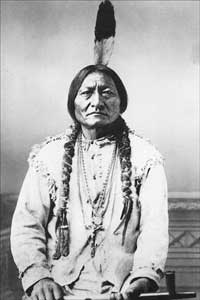A Cycle of the West

A Cycle of the West – dzieło poetyckie amerykańskiego autora Johna G. Neihardta[1]. Utwór składa się z pięciu poematów epickich: The Song of Three Friends (1919), The Song of Hugh Glass (1915), The Song of Jed Smith (1941), The Song of the Indian Wars (1925) i The Song of the Messiah (1935)[2]. Wydanie zbiorcze ukazało się w 1949[3]. Utwór opowiada o osadnictwie na preriach i wysiedlaniu Indian z ich tradycyjnej ojczyzny. Napisanie wszystkich części eposu zajęło autorowi dwadzieścia dziewięć lat[4][1]. Utwór jest napisany dystychem bohaterskim (heroic couplet)[5], czyli parzyście rymowanym pentametrem jambicznym[6].
Who now reads clear the roster of that band?
Alas, Time scribbles with a careless hand
And often pinchbeck doings from that pen
Bite deep, where deeds and dooms of mighty men
Are blotted out beneath a sordid scrawl!
One hundred strong they flocked to Ashley's call
That spring of eighteen hundred twenty-two;
For tales of wealth, out-legending Peru,
Came wind-blown from Missouri's distant springs,
And that old sireny of unknown things
Bewitched them, and they could not linger more.
(The Song of Three Friends)
Przypisy[edytuj | edytuj kod]
- ↑ a b John Gneisenau Neihardt, [w:] Encyclopædia Britannica [dostęp 2016-12-29] (ang.).
- ↑ A Cycle of the West. nebraskapress.unl.edu. [dostęp 2016-12-29]. (ang.).
- ↑ John G. Neihardt (1881 - 1973). shsmo.org. [dostęp 2016-12-29]. [zarchiwizowane z tego adresu (2016-12-30)]. (ang.).
- ↑ John G. Neihardt Memorial Room. nebraskahistory.org. [dostęp 2016-12-29]. (ang.).
- ↑ heroic couplet, [w:] Encyclopædia Britannica [dostęp 2016-12-29] (ang.).
- ↑ metre, [w:] Encyclopædia Britannica [dostęp 2016-12-29] (ang.).
Bibliografia[edytuj | edytuj kod]
- John Gneisenau Neihardt: The song of three friends. Archive.org. [dostęp 2016-12-29]. (ang.).
